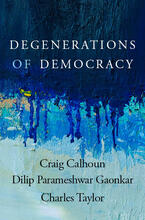
Publications
(with Dilip Gaonkar and Charles Taylor), (2022) Harvard University Press.
From the publisher - Three leading thinkers analyze the erosion of democracy’s social foundations and call for a movement to reduce inequality, strengthen inclusive solidarity, empower citizens, and reclaim pursuit of the public good.
Democracy is in trouble. Populism is a common scapegoat but not the root cause. More basic are social and economic transformations eroding the foundations of democracy, ruling elites trying to lock in their own privilege, and cultural perversions like making individualistic freedom the enemy of democracy’s other crucial ideals of equality and solidarity. In Degenerations of Democracy three of our most prominent intellectuals investigate democracy gone awry, locate our points of fracture, and suggest paths to democratic renewal. (more)
Reviews
Special Issue Global Perspectives
- Crawford, B. “Democracy for the Few.” Global Perspectives 4, no. 1 (2023): 70346. https://doi.org/10.1525/gp.2023.70346.
- Hechter, M. “Review of Degenerations of Democracy.” Global Perspectives 4, no. 1 (2023). University of California Press. https://doi.org/10.1525/gp.2023.72771.
- Zielonka, J. “Degenerations of Democracy.” Global Perspectives 4, no. 1 (2023): 70092. https://doi.org/10.1525/gp.2023.70092.
- Zipperstein, S. E. “Technology and Democracy.” Global Perspectives 4, no. 1 (2023): 68114. https://doi.org/10.1525/gp.2023.68114.
Special Issue The Tocqueville Review
- Cozzaglio, Ilaria. "Perceiving Democracy." The Tocqueville Review/La revue Tocqueville 45, no. 2 (2024): 186-192. https://muse.jhu.edu/article/947961.
- Harsin, Jayson. "The Deep Media and Communication Structure of Degenerations (and Renewals)." The Tocqueville Review/La revue Tocqueville 45, no. 2 (2024): 193-203. https://muse.jhu.edu/article/947962.
- Sawyer, Stephen W. "Doubling Democracy." The Tocqueville Review/La revue Tocqueville 45, no. 2 (2024): 204-211. https://muse.jhu.edu/article/947963.
- Calhoun, Craig, and Charles Taylor. "Can Empowered Citizens Save Democracy?" The Tocqueville Review/La revue Tocqueville 45, no. 2 (2024): 212-219. https://muse.jhu.edu/article/947964.
Additional Selected Book Reviews
- Kloppenberg, J.T. (2023. Is American Democracy Coming Apart? Redeeming the promise of self-rule. Commonweal Magazine. https://www.commonwealmagazine.org/democracy-race-polarization-america-working-class-trump-kloppenberg
- Fong, B. Y. (2022). The Material and the Participatory in the Green New Deal: Two Questions about the Vision of Democratic Renewal in Degenerations of Democracy. In Critical Sociology 49(2), 327–329). SAGE Publications. https://doi.org/10.1177/08969205221134299
(2012) Chicago: University of Chicago Press.
“This collection of Craig Calhoun's essays brings us back to essentials: what do we mean by the terms “class” and “radicalism,” and how do these concepts help us to understand the social movements and conflicts of early industrial society? … Among his other accomplishments, Calhoun illustrates how difficult it is to draw a line between the “traditional” protests of the early nineteenth century and the “modern” class protests envisioned by most social historians.” — James R. Barrett, American Historical Review.
(2007) Routledge.
From the publisher — Craig Calhoun, one of the most respected social scientists in the world, re-examines nationalism in light of post-1989 enthusiasm for globalization and the new anxieties of the twenty-first century. Nations Matter argues that pursuing a purely postnational politics is premature at best and possibly dangerous. Calhoun argues that, rather than wishing nationalism away, it is important to transform it. One key is to distinguish the ideology of nationalism as fixed and inherited identity from the development of public projects that continually remake the terms of national integration. Standard concepts like "civic" vs. "ethnic" nationalism can get in the way unless they are critically re-examined — as an important chapter in this book does.
(1997) Open University Press and University of Minnesota Press.
From the publisher: Nationalism is one of the most pressing of global problems, exacerbating ethnic conflicts and increasing the likelihood of war. It is also basic to defining the rights of democratic citizenship, and can be a source of inspiration and social solidarity. In this fascinating overview, Craig Calhoun considers nationalism's diverse manifestations, its history, and its relationship to imperialism and colonialism
(1995) Basil Blackwell.
From the publisher: In this outstanding reinterpretation — and extension — of the Critical Theory tradition, Craig Calhoun surveys the origins, fortunes and prospects of this most influential of theoretical approaches. Moving with ease from the early Frankfurt School to Habermas, to contemporary debates over postmodernism, feminism and nationalism, Calhoun breathes new life into Critical Social Theory, showing how it can learn from the past and contribute to the future.




